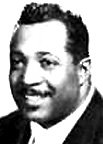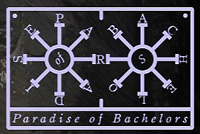Clarence Fountain - Just A Closer Walk (Jewel 160)

Just A Closer Walk
Part Two of Four
When The Five Blind Boys of Mississippi left Vee-Jay Records for Don Robey's Peacock label in the late fifties, Vee-Jay came knocking on the door of The Five Blind Boys of Alabama. Once their contract with Savoy was up, they signed with the better known (in the Gospel field, anyway) Chicago label, which was clearly seen as a step up. Vee-Jay, who had released the Mississippi group's records as 'The Original Five Blind Boys', now billed them as the 'Original Blind Boys Of Alabama'. The Blind Boys had found a home, and their records from this period show it... great high energy stuff that demonstrates how far they had come, not only as vocalists, but as a band as well. Unfortunately for them, (and us, too) Vee-Jay went bankrupt in 1965, and left 'The Boys' without a contract.
Vee-Jay, who had released the Mississippi group's records as 'The Original Five Blind Boys', now billed them as the 'Original Blind Boys Of Alabama'. The Blind Boys had found a home, and their records from this period show it... great high energy stuff that demonstrates how far they had come, not only as vocalists, but as a band as well. Unfortunately for them, (and us, too) Vee-Jay went bankrupt in 1965, and left 'The Boys' without a contract.These were trying times for traditional Gospel 'quartets', as there was not much of a market for their music outside of Church. Although they continued to get work, the 'money was gettin' funny', and arguments within the group began to drive them apart. Clarence Fountain apparently felt that he was the 'star', and that he should be paid more than the other founding members. This wasn't going to fly, and so he left The Blind Boys in 1969.
 Stan Lewis signed him up as a solo artist for his Shreveport, Louisiana based Jewel label. Lewis had started out with a jukebox route, and was able to open his own record store in 1948. He was quite the entrepreneur, and built up his mail-order business by advertising on the radio, especially on John R's fabled WLAC broadcasts. Before long, Stan became the 'go-to' distributor in the region for all the major labels, developing close ties with Chess in particular. He started his own label, Jewel, in 1963 and soon branched out to form the Paula and Ronn labels as well. Originally producing swamp pop and R&B records by local talent like Cookie and the Cupcakes, John Fred, and Bobby Charles, Lewis began his Gospel 'Devotional Series' in 1966. Signing the great Clarence Fountain must have been seen as quite the 'feather in his cap'.
Stan Lewis signed him up as a solo artist for his Shreveport, Louisiana based Jewel label. Lewis had started out with a jukebox route, and was able to open his own record store in 1948. He was quite the entrepreneur, and built up his mail-order business by advertising on the radio, especially on John R's fabled WLAC broadcasts. Before long, Stan became the 'go-to' distributor in the region for all the major labels, developing close ties with Chess in particular. He started his own label, Jewel, in 1963 and soon branched out to form the Paula and Ronn labels as well. Originally producing swamp pop and R&B records by local talent like Cookie and the Cupcakes, John Fred, and Bobby Charles, Lewis began his Gospel 'Devotional Series' in 1966. Signing the great Clarence Fountain must have been seen as quite the 'feather in his cap'.By the early seventies, many of the independent labels had either gone out of business, or were being sold off to the big corporations. Lewis, kind of like the 'last man standing', was able to pick up some of the pieces (just as Malaco would a decade later). Great artists like Charles Brown, Lowell Fulson and Lightnin' Hopkins found themselves without a contract, and were soon recording for Jewel. In addition to the performers, great producers & arrangers were also suddenly available, and Lewis snatched 'em up.
 The record you're listening to now is a case in point. The producer, Ralph Bass, has absolutely incredible credentials. He came up in the forties with the Black and White and Savoy labels, recording people like Roosevelt Sykes, T-Bone Walker, and Big Joe Turner, as well as the best of the 52nd Street Jazz scene in New York. In 1951, Bass signed with Syd Nathan's King Records where he was assigned his own subsidiary label, Federal. He produced some of the best R&B records ever made (like Sixty Minute Man and Work With Me Annie) and, in 1955 (legend has it) he drove from Atlanta to Macon in the middle of the night to sign James Brown and the Famous Flames before Leonard Chess did. Chess got his revenge a few years later when he hired Bass away from Federal and put him in charge of production for his own labels. It boggles the mind to think of the records that he worked on while he was there in Chicago (think Howlin' Wolf, Muddy Waters, Etta James...). Unreal.
The record you're listening to now is a case in point. The producer, Ralph Bass, has absolutely incredible credentials. He came up in the forties with the Black and White and Savoy labels, recording people like Roosevelt Sykes, T-Bone Walker, and Big Joe Turner, as well as the best of the 52nd Street Jazz scene in New York. In 1951, Bass signed with Syd Nathan's King Records where he was assigned his own subsidiary label, Federal. He produced some of the best R&B records ever made (like Sixty Minute Man and Work With Me Annie) and, in 1955 (legend has it) he drove from Atlanta to Macon in the middle of the night to sign James Brown and the Famous Flames before Leonard Chess did. Chess got his revenge a few years later when he hired Bass away from Federal and put him in charge of production for his own labels. It boggles the mind to think of the records that he worked on while he was there in Chicago (think Howlin' Wolf, Muddy Waters, Etta James...). Unreal. The arranger, Sonny Thompson, has quite the history as well. Sonny had a couple of #1 R&B hits in 1948 (Long Gone and Late Freight) on Miracle Records, and would continue to chart when he moved to King in 1952. He eventually became the head of A&R for the label (I'm assuming he took Bass' place in 1958), and was the man behind all those great Freddie King instrumentals, producing and arranging them as well as ticklin' the ol' ivories... imagine?
The arranger, Sonny Thompson, has quite the history as well. Sonny had a couple of #1 R&B hits in 1948 (Long Gone and Late Freight) on Miracle Records, and would continue to chart when he moved to King in 1952. He eventually became the head of A&R for the label (I'm assuming he took Bass' place in 1958), and was the man behind all those great Freddie King instrumentals, producing and arranging them as well as ticklin' the ol' ivories... imagine?Anyway, the point is that by the time this record was made in 1971, Clarence Fountain found himself hooked up with some of the heaviest hitters in the business, and was really going for it. Check out the big production, with the background singers and everything! Even though Clarence was sticking to his promise to 'stay out in the Gospel field', his amazing vocals here would have put many a secular soul singer to shame.
Unfortunately, despite their quality, none of Fountain's Jewel LPs would sell much, and his career was going nowhere.
He would rejoin the Blind Boys in 1980.












1 Comments:
Good Job! :)
Post a Comment
<< Home